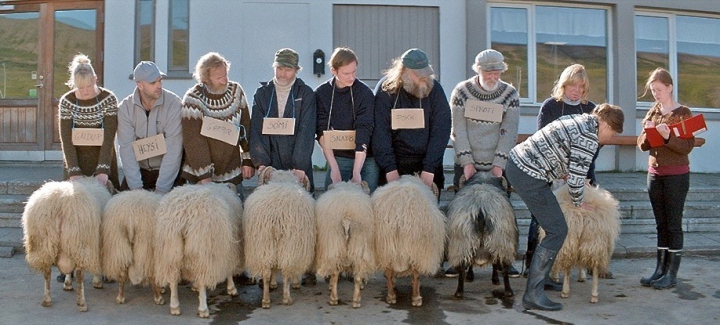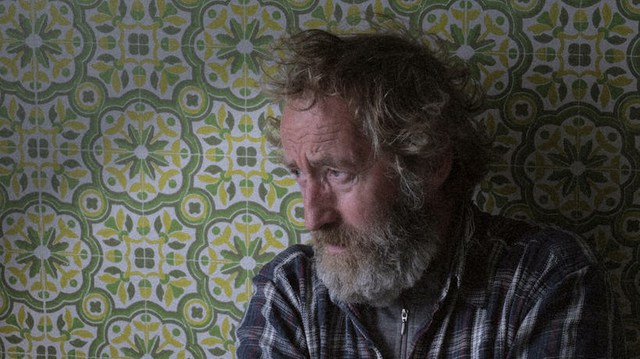Interview: 'Rams' Director Grímur Hákonarson on Working with Sheep and Icelandic Idiosyncrasy
 Wednesday, February 3, 2016 at 12:30PM
Wednesday, February 3, 2016 at 12:30PM In Grímur Hákonarson’s darkly funny Rams, two brothers who haven’t spoken in decades must unite forces to save their legacy when the government demands all their livestock must be slaughtered to contain a disease. Hidden behind long beards and stubbornness, Gummi (Sigurður Sigurjónsson) and Kiddi (Theodór Júlíusson) take on the impossible task of trying to outsmart the government, making for a fascinating allegory about the things we lose in the name of progress. After premiering at the Cannes Film Festival, where it won the top prize in the Un Certain Regard category, Rams went on to being chosen as Iceland’s Foreign Language Oscar submission. As the film opens in the US, I got a chance to sit down with Hákonarson who spoke about how his childhood shaped the film, how Cannes changed his life, and shared interesting trivia about sheep.
JOSE: Your parents used to send you to the country to work during the summers. Did you ever think of this as a punishment in any way?

GRÍMUR HÁKONARSON: Not really, my grandfather was a farmer so I would work at his farm, my mother would also send me to work at random farms in the area, even though I stayed at my grandfather’s farm. I think the reason was they wanted me to be more independent, to have me go to a place where I didn’t know anyone and have me start from scratch. They thought that would make me stronger, it wasn’t a punishment.
JOSE: Was that a common practice with other young men?
GRÍMUR HÁKONARSON: Yeah, it was common. I grew up in Reykjavik, and in school there weren’t many people like that who would this during the summer.
JOSE: Did you stand out as “the city guy” when you were in the country?
GRÍMUR HÁKONARSON: Of course I was a bit different from kids my ages, guys in the countryside were interested in cars, motorcycles, and I was interested in films, books...I think I was never a great agricultural worker, I was OK, I wasn’t made to be on a tractor, I’m a thinker. I never felt like I wasn’t welcome though, there was nothing negative.
JOSE: Were you writing short stories or screenplays in your free time there?
GRÍMUR HÁKONARSON: I wasn’t. I was in a theatre group in school which kept me active, but I wasn’t writing on a regular basis.
The reason why I’m asking all these questions about your youth is because I was curious, as to whether you coming back to the country to make Rams felt in any way like a similar process. Like the big city coming into the country?
I shot the movie in a different area. I grew up in the South, and the film is set in the North. Where we shot the film is very isolated, they have very difficult winters, people have been moving away, like in the movie, sheep farming is in decline. It’s difficult to live there and I kinda felt good about coming there and giving people jobs, it was good for their economy and to give a creative space to arty people from the area.
Grímur Hákonarson photographed in NYC. Credit: Jose Solis
Were there instances of people who had never done films becoming interested in them after working with you?
There were some people, one of the farmers who was an actor in the local theater got a part in the film, so his dreams came true. There were also some young people who were talking about going to film school, one girl who was a production assistant now has her own company and is doing quite well.
I knew two siblings who stopped talking for over fifty years, and I always thought it was maybe one of those things that they’d been doing for so long, they might have forgotten how it all got started. The brothers in the film made me think of that, since we never know what drew them apart. Was it important for you to know this?
Yes, I wrote a history of them, you can’t see it in the movie literally, but it’s there. It was important for me that the actors had this backstory in order to build their characters. I think what happened with them is they had a conflict, fought and as time passed it was harder to reconcile, you get used to how things are. Sometimes it can be over a ridiculous, unreasonable thing, but it’s like a domino effect, things get bigger. Sometimes it can be over silly words, like “you’re ugly” or “you don’t know how to do this”.
These fraternal fights are also very Biblical, did you have any influence from religious stories when you wrote the screenplay?
I wasn’t thinking about the Bible, I know people compare the story to Cain and Abel, and some people see a reference to the Icelandic economic crisis, in which foreign money is coming into the country. But the them I deal with in Rams is Icelandic mentality, histor, sheep farming is part of who we are, as I wrote I thought about this more than anything else.
What’s the most random fact you learned about sheep?
(Laughs) One thing was when we shot the sex scene, when the ram comes to have sex with the sheep, it was quite funny and surprising to see the ram always wanted to have sex with the same sheep. It also took him a short time to reach orgasm, like two seconds. I didn’t know about that.
Poor lady sheep. I read somewhere that some of the sheep were less shy than others and would actually come to the humans so they would pet them. Were there sheep who were trying to steal the spotlight from others?
They’re group animals, some of them were more calm, but most of them were used to people. Some of them would come to us, but none of them stood out.
The film struck me as perversely funny and it could’ve been romantic or Disney-like. Did you always know you wanted to have a dark ending?
I don’t think the ending is dark, it’s open and makes people thinks, I think it affects people emotionally, so I’m happy about how it turned out. The last part of the film is symbolic, a return to where we all came from. Things are getting modernized, so it’s a fitting theme, these people are trying to preserve the tradition of sheep and fighting for life, that’s something Biblical about that I guess!
How has your life changed since the film premiered in Cannes and was then submitted for the Oscars?
Everything changed after Cannes, before that no one knew me, maybe some people knew me in Iceland, but this put me on the map. I’ve been getting lots of offers since that, a lot of doors have opened, I just need to pick what door I’m going to go through.

Rams opens today in limited release.
 Grímur Hákonarson,
Grímur Hákonarson,  Iceland,
Iceland,  foreign films,
foreign films,  interview,
interview,  zoology
zoology 


Reader Comments (3)
Great interview, I hadn't heard about this film.
(Although I did miss your SAG Awards fashion analysis...)
Thanks for the interview! It's a great movie, and hope this encourages more people to check it out.
I interviewed him as well. Such a great film and an interesting filmmaker. Looking forward to more from him, especially if he stays in Iceland.